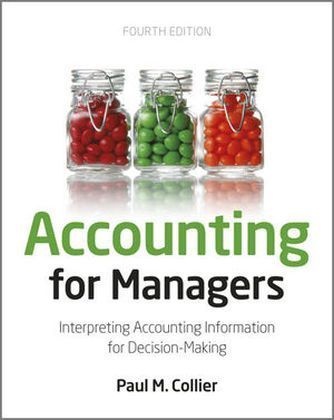Share
Fr. 84.00
Paul M Collier, Paul M. Collier
Accounting for Managers - Interpreting Accounting Information for Decision-Making
English · Paperback / Softback
Shipping usually within 1 to 3 weeks (not available at short notice)
Description
Zusammenfassung This updated and revised fourth edition of Accounting for Managers builds on the international success of the previous editions in explaining how accounting is used by non-financial managers.Emphasizing the interpretation rather than the construction of accounting information! Accounting for Managers encourages a critical! rather than an unthinking acceptance of accounting techniques. Whilst immensely valuable for planning! decision-making and control! users of accounting information need to recognize the assumptions behind! and the limitations of particular accounting techniques.As in the previous editions! Accounting for Managers links theory with practical examples and case studies drawn from real business situations across a wide range of manufacturing! retail and service industries. Inhaltsverzeichnis PART I: CONTEXT OF ACCOUNTING1. Introduction to Accounting.2. Accounting and its Relationship to Shareholder Value and Corporate Governance.3. Recording Financial Transactions and the Principles of Accounting.4. Management Control! Management Accounting and its Rational-Economic Assumptions.5. Interpretive and Critical Perspectives on Accounting and Decision-Making.PART II: THE USE OF FINANCIAL REPORTS FOR DECISION-MAKING6. Constructing Financial Reports: IFRS and the Framework of Accounting.7. Interpreting Financial Reports and Alternative Perspectives.8. Accounting for Inventory.PART III: USING ACCOUNTING INFORMATION FOR DECISION-MAKING! PLANNING AND CONTROL9. Accounting and Information Systems.10. Marketing Decisions.11. Operating Decisions.12. Human Resource Decisions.13. Accounting Decisions.14. Strategic Investment Decisions.15. Performance Evaluation of Business Units.16. Budgeting.17. Budgetary Control.18. Strategic Management Accounting.PART IV: SUPPORTING INFORMATION.ReadingsGlossary of Accounting TermsSolutions to QuestionsIndex
List of contents
Preface to the Fourth Edition xvii
About the Author xxi
Acknowledgements xxii
PART I Context of Accounting 1
1 Introduction to Accounting 3
Accounting, accountability and the account 3
Introducing the functions of accounting 5
A short history of accounting 6
The role of financial accounting 7
The role of management accounting 8
Recent developments in accounting 10
The relationship between financial accounting and managementaccounting 12
A critical perspective 13
Conclusion 15
References 15
Questions 16
2 Accounting and its Relationship to Shareholder Value andCorporate Governance 17
Capital and product markets 17
Shareholder value-based management 18
Shareholder value, strategy and accounting 21
Company regulation and corporate governance 23
The regulation of companies 23
Corporate governance 23
Principles of corporate governance 24
Responsibility of directors 24
Audit 25
Audit committees 25
Stock Exchange Listing Rules 26
Risk management, internal control and accounting 26
A critical perspective 27
Conclusion 28
References 28
Websites 28
Questions 29
3 Recording Financial Transactions and the Principles ofAccounting 30
Business events, transactions and the accounting system 30
The double entry: recording transactions 31
Extracting financial information from the accounting system35
Basic principles of accounting 37
Accounting entity 37
Accounting period 37
Matching principle 38
Monetary measurement 38
Historic cost 38
Going concern 39
Conservatism 39
Consistency 39
Cost terms and concepts: the limitations of financial accounting39
Conclusion 41
References 41
Questions 42
4 Management Control, Accounting and its Rational-EconomicAssumptions 44
Management control systems 44
Planning and control in organizations 47
Non-financial performance measurement 51
A theoretical framework for accounting 55
Conclusion 56
References 56
Websites 58
5 Interpretive and Critical Perspectives on Accounting andDecision Making 59
Research and theory in management control and accounting 60
Alternative paradigms 62
The interpretive paradigm and the social constructionperspective 65
Culture, control and accounting 67
The radical paradigm and critical accounting 68
Power and accounting 70
Case study 5.1: easyJet 71
Ethics and accounting 74
Case study 5.2: Enron 76
Case study 5.3: WorldCom 77
Conclusion 77
References 78
PART II The Use of Financial Statements for Decision Making81
6 Constructing Financial Statements: IFRS and the Frameworkof Accounting 83
International Financial Reporting Standards (IFRS) 84
Framework for the Preparation and Presentation of FinancialStatements 85
Objectives of financial statements 86
Qualitative characteristics of financial statements 86
Elements of financial statements 87
Concepts of capital maintenance 88
True and fair view 88
Reporting profitability: the Statement of Comprehensive Income89
Reporting financial position: the Statement of FinancialPosition 92
Accruals accounting 94
Depreciation 95
Specific IFRS accounting treatments 97
Accounting for sales taxes 98
Accounting for goodwill and impairment testing 98
Accounting for research and development expenditure 99
Accounting for leases 99
Reporting cash flow: the Statement of Cash Flows 100
Differences between the financial statements 102
Illustration 102
A theoretical perspective on financial statements 103
Agency theory 104
A critical perspective on financial statements and accountingstandards 105
Conclusion 105
Reference 106
Websites 106
Appendix: IFRS as at 1 January 2011 106
Questions 107
7 Interpreting Financial Statements 111
Annual Reports 111
The context of financial statements 113
Ratio analysis 113
Profitability 115
Return on (shareholders') inv
Report
Competitive Advantage:
Holds a unique position between theory and practice putting techniques into their academic context. One of our reviewers commented the text provides an ideal blend for postgraduate students so that they can get to grips with the key issues but put them in a wider context.
According to another reviewer Collier is tailored for the postgraduate market generalist who needs a working knowledge of financial and management accounting techniques and an awareness of the assistance that can be provided by the accounting function in decision making and organizational and financial control. There is no other text that fulfils this specific need.
Product details
| Authors | Paul M Collier, Paul M. Collier |
| Publisher | Wiley, John and Sons Ltd |
| Languages | English |
| Product format | Paperback / Softback |
| Released | 31.12.2012 |
| EAN | 9781119979678 |
| ISBN | 978-1-119-97967-8 |
| No. of pages | 580 |
| Subjects |
Social sciences, law, business
> Business
> Business administration
Rechnungswesen, Buchhaltung, Accounting, Allg. Rechnungswesen |
Customer reviews
No reviews have been written for this item yet. Write the first review and be helpful to other users when they decide on a purchase.
Write a review
Thumbs up or thumbs down? Write your own review.

